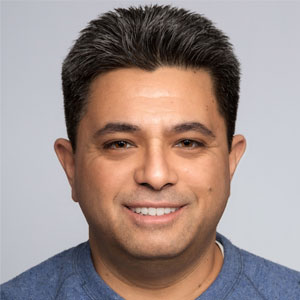Spotlight On: Adam Miyashiro
 Galloway, N.J. — Adam Miyashiro, professor of Literature at Stockton, recently completed a yearlong project with the Arizona Center of Medieval and Renaissance Studies (ACMRS) at Arizona State
University, which consisted of a series of videos teaching medieval literature.
Galloway, N.J. — Adam Miyashiro, professor of Literature at Stockton, recently completed a yearlong project with the Arizona Center of Medieval and Renaissance Studies (ACMRS) at Arizona State
University, which consisted of a series of videos teaching medieval literature.
“This project comes out of RaceB4Race, a small research symposium created at the ACMRS in response to the movement started by the academic group Medievalists of Color, of which I am a co-founder. The group sought to challenge the exclusionary and racist composition of medieval studies fields and to bring attention to scholars of color who work in premodern fields, and also to the questions of how race and cultural difference were understood in the medieval period,” Miyashiro shared.
It is part of a free online resource called Throughlines, which grew from a Mellon-funded grant through ACMRS. Throughlines “aims to expand curricular development, field diversification, academic mentorship and public humanities work around race in premodern humanities fields.” This site highlights videos and resources for teaching race in pre- and early modern classrooms in higher education. It is a collaborative effort from faculty of color from around the medieval and early modern fields of study in literature, history, art history, philosophy and related disciplines.
The study of the past – in literature, history, arts, sciences and philosophy – always gives us clues to our modern problems, helps to contextualize our current period, and gives us a space to imagine possibilities we might not have previously considered.Adam Miyashiro
Miyashiro’s passion for medieval literature is rooted in how the past can often reflect the present. “The study of the past – in literature, history, arts, sciences and philosophy – always gives us clues to our modern problems, helps to contextualize our current period, and gives us a space to imagine possibilities we might not have previously considered.
"Can we imagine a society without money? Or grocery stores? Or cars, planes, or cell phones?” he questioned. “Our pasts show us how humanity grew and changed without the presence of modern technology, how our societies adapted to climate changes, diseases and pandemics. During the COVID-19 outbreak in 2020, many people compared the virus to the great plague outbreak of the 14th century, which led to comparisons, differences and similarities in how we understand the disease culturally and socially as well as medically. Many of these descriptions of society’s response to the plague were found in medieval literary texts like Boccaccio’s "Decameron." This is why the study of literature more broadly is so important in our ever-changing world.”
For aspiring young writers and readers, Miyashiro offered a piece of advice: “Read widely and be curious. Read things that may not be your primary interest, and read things that may not come from your own culture.”
Personally speaking ...
💭 What is something about yourself people may not know?
I grew up in Hawaiʻi in a multicultural and multilingual household where we spoke Hawaiian Creole English, Swedish, Japanese and Okinawan languages. I learned French as a child, and that's how I became interested in the field of comparative literature, which requires the knowledge of multiple languages.
💭 What is your favorite book, poem and why?
I don’t have an all-time favorite book, but the most recent book I really loved was RF Kuang’s "Babel: Or the Necessity of Violence: An Arcane History of the Oxford Translators' Revolution," which is a speculative sci-fi/fantasy novel that imagines an anti-colonial movement among linguistics scholars in early 19th century Britain. I’m teaching it this semester in my Senior Seminar on Utopian/Dystopian Literatures.
Reported by Mandee McCullough
Photo submitted


